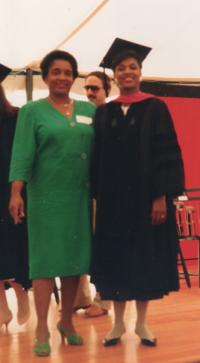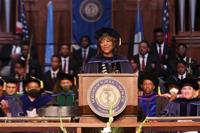Valerie Montgomery Rice: Making History, One HBCU at a Time
Rice broke barriers as the first woman leader at two HBCU medical schools, and she’s committed to health equity and training more Black doctors.
by Donnell Suggs, The Atlanta Voice
There are only four Historically Black Colleges and Universities (HBCU) medical schools in the United States — Morehouse School of Medicine, Meharry Medical College, Howard University College of Medicine, and Charles R. Drew University of Medicine and Science.
Valerie Montgomery Rice has played a significant role at two of them. She’s not just the sixth president of Morehouse School of Medicine; she’s the first woman to run it. And over at Meharry Medical College in Nashville? She was the dean of the School of Medicine and senior vice President of health affairs during her tenure.
But Montgomery Rice isn’t just about accolades and making history. She’s fighting health disparities and pushing for more Black physicians in communities that need them most. For example, Black women are three to four times more likely to die of pregnancy-related causes than white women. Rice is working to move the needle by training more Black physicians and placing them in underserved communities.
“We understand it matters who we educate and train in order to eliminate health disparities,” Montgomery Rice says. “The world needs what we do best even more now. Unfortunately, we have seen a widening in the gap between health outcomes such as diabetes, hypertension, and heart disease with more Black and Brown people being diagnosed and undertreated.”
Montgomery Rice’s connection to HBCUs began in 2000 when she became the founding director of the Center for Women’s Health Research at Meharry Medical College, which was founded in 1876.
Montgomery Rice initially “said no” to the job, but the recruiter, the dean of the medical school at that time, reminded her of her responsibility as a Black physician. So Montgomery Rice headed to Nashville where she found, “the most dedicated group of faculty members in a department that I had ever seen and how they were changing lives — not just for the students’ lives that they are touching, but for the community that they are influencing.”
Educational Roots
A love of learning and achievement was instilled in Montgomery Rice at an early age.
“The legacy of education for my three sisters and I started with my mother,” she explains.
She grew up with the sound of her mom Annette Alexander murmuring early morning affirmations to her.
“When she was going to work in the morning, and that was around 6:10 a.m., you would hear the words in your ear,” Montgomery Rice, a native of Macon, Georgia, recalls. “This is what she did for her girls, and though it was a joke for us then, it was a positive affirmation for us [too]. She wanted us to start or end our days with those thoughts in our minds.”
Alexander worked the swingshift for 25 years at the now-defunct Georgia Kraft Paper Company in Atlanta and rose to become the highest-ranking female machinist there.
“That job was a turning point for the economic well-being of our family,” Montgomery Rice says. “My mother wanted more for her daughters than she could fathom for herself.” And her daily words of affirmation planted seeds of ambition and dedication in her children.
Montgomery Rice’s mom whispered, “All things are possible” and “Think positive thoughts” as she headed out to work. That’s not just parenting — that’s prophesying.
Breaking Ground in Academia
“For me, education has been the equalizer, because whenever I was challenged with something I always knew I could out-study and outlearn anybody” Montgomery Rice says.
After high school, Montgomery Rice headed to Georgia Tech, and then on to Harvard Medical School. She eventually landed at the University of Kansas, in Lawrence, Kansas, breaking ground as the first Black faculty member in the obstetrics and gynaecology department.
“It was my first job, and felt very much in a Caucasian world,” Montgomery Rice remembers.
Undeterred by the lack of diversity, Montgomery Rice says she helped raise the enrollment of Black participants in the clinical trials that were taking place at the university. She made sure to diversify the study coordinators under her charge to better relate to participants.
“I started to see that those people had license to go into those communities and recruit because there was trust,” Montgomery Rice says.
Then in 2000, Meharry Medical College called.
Montgomery Rice accepted the job in Nashville. She immediately recognized that her work at the University of Kansas may have been making a difference, but at Meharry, and later at Morehouse School of Medicine, what she did every day made a difference in more than just students. Her work affected faculty members, staffers, and partners that the school engaged with.
She joined Morehouse School of Medicine in 2011 and climbed the ranks to become dean, executive vice president, and eventually, the CEO and president.
“I thought I could have a greater impact and imprint, and I have been able to realize that at both institutions,” Montgomery Rice said. “I’m very happy where I am.”

Her trophy cabinet? Stacked. Georgia Trend Magazine’s 100 Most Influential Georgians, honorary degrees — you name it, she’s probably got it. But she’s still looking at these glaring gaps in healthcare outcomes and saying, “no, we can do better.”
Although there were as many as 19 HBCU medical schools at one point in time, that there are only four remaining doesn’t discourage Montgomery Rice.
“We produce 10 times more Black physicians than all the top 10 medical schools in the country,” Montgomery Rice says. “Our presence is still important because the data is clear, when there is concordance whether by race, gender, or cultural experience, there’s improved patient outcomes.”

About Deloitte
Deloitte refers to one or more of Deloitte Touche Tohmatsu Limited, a UK private company limited by guarantee (“DTTL”), its network of member firms, and their related entities. DTTL and each of its member firms are legally separate and independent entities. DTTL (also referred to as “Deloitte Global”) does not provide services to clients. In the United States, Deloitte refers to one or more of the US member firms of DTTL, their related entities that operate using the “Deloitte” name in the United States and their respective affiliates. Certain services may not be available to attest clients under the rules and regulations of public accounting. Please see www.deloitte.com/about to learn more about our global network of member firms.
This item also appeared in The Exchange. a Deloitte Development LLC publication



